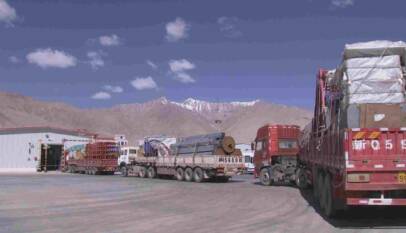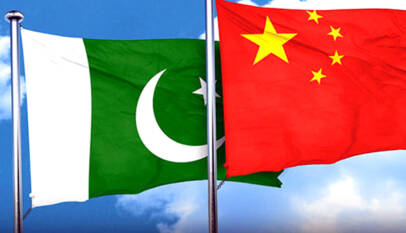China working to develop economic forest industry in Gwadar
Professor Wang Sen from the Central South University of Forestry and Technology (CSUFT) has said that China is working to develop Gwadar’s forest industry while also building a port. He has been spearheading research on tropical arid desert of Gwadar since 2018 and has cultivated a garden at Gwadar with various species of woody and floral plants. He is of the view that if economic crops are planted, the forests can grow thicker with time. This project is also supported by Pakistani Ministry of Climate Change, University of Karachi, and Indus University.
“We not only try to build a beautiful port, but also want to develop the economic forest industry in the Gwadar city,” said Professor Wang Sen from the Central South University of Forestry and Technology (CSUFT) in an interview to China Economic Net (CEN).
Professor Wang, an expert on economic forestry, has been committed to cultivating tropical arid economic plants in Gwadar since late 2018 when the Gwadar port was a stretch of desert. The sight of the barren land inspired him to pioneer a research on tropical arid economic forest in a bid to bring both ecological and economic value to the hub. “Even in the temperate zone with sufficient rain and fertile soil, trees may die, let alone on a tropical arid desert”.
Despite the technical difficulties, Professor Wang compiled a comprehensive record of the tropical arid economic plants in Gwadar and established a tissue culture lab along with necessary laboratories for disinfection, breeding, etc. under the support of Yulin Holdings and China Overseas Holding Group.
Woody grain and oil species, woody fodder species, and woody floral species are being or have been introduced to the cultivation demonstration garden at Gwadar.
For example, a kind of Chinese jujube called “zhongqiusucui”, a new type that was cultivated by Professor Wang and matures around the Mid-autumn festival, or “Zhongqiu”, has successfully grown in the garden. Resistant to drought and rich in vitamin, it has the potential to provide nutrition for the vessels at the port.
Fruit is another important part of economic forests. “We are now focusing on naseberry, a raw material of jam with high nutritious value”, Professor Wang told CEN. A germplasm resource garden of tropical arid economic plants is under construction based on previous investigations on hundreds of local germplasm.
By collecting and making the specimen of representative plants viable in tropical arid regions, the team aims to identify germplasm with high economic value and preserve them in the form of living plants. Furthermore, the breeding technique is being explored through genetic research.
“Unlike some food crops that require continuous cropping, which undermines soil fertility, economic crops like jujube can grow for decades”. According to Professor Wang, to discover and develop a suitable species that can survive in tropical arid regions not only serves innovation in scientific research, but more importantly, it complies with Pakistan’s green initiative and holds the prospect to alleviate poverty, as has been proved in China.
Once successful in the laboratory, it can be promoted in other “Belt and Road” countries with similar climate. Based on the tropical arid economic forest laboratory, Central South University of Forestry and Technology (CSUFT), the birthplace of China’s economic forestry discipline, is providing post-doctoral education to Pakistani students.
The project is also supported by Pakistani Ministry of Climate Change, University of Karachi, and Indus University.
Sahiwal power plant hosts grand Eid Festival to strengthen workplace unity
ISLAMABAD, Apr 02 (APP): The 1320 MW Sahiwal Coal-Fired Power Plant recently hosted a gran…











